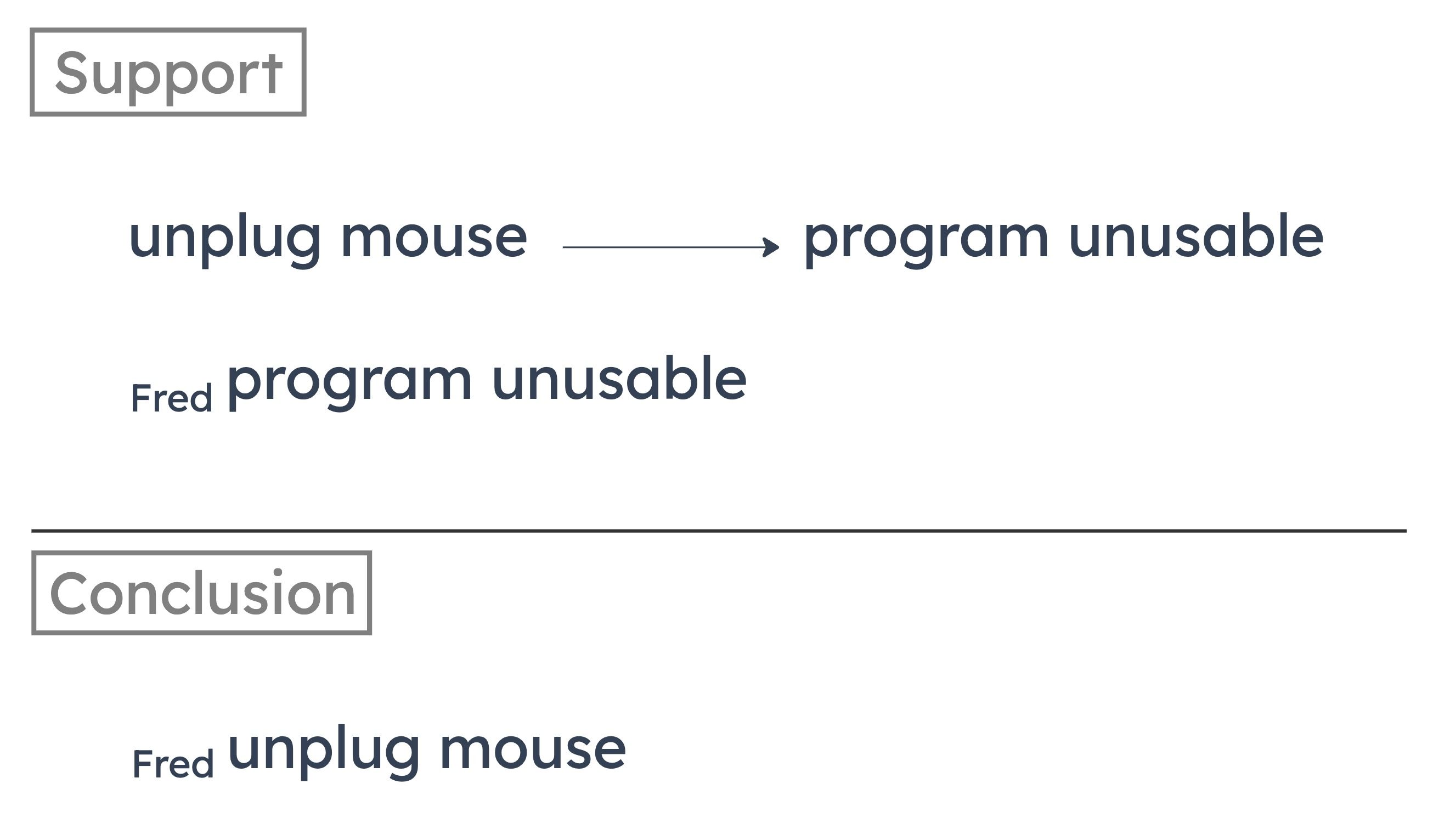Summarize Argument: Phenomenon-Hypothesis
The author concludes that Fred’s computer mouse must have been unplugged. He supports this by saying that unplugging the mouse from a computer causes all programs that require the mouse to become unusable. He then notes that a software program on Fred’s computer that requires the mouse has become unusable.

Identify and Describe Flaw
This is the flaw of mistaking sufficiency for necessity. The author treats “unplugging the mouse” as necessary for “the program becoming unusable.” But according to his argument, “unplugging the mouse” is sufficient, not necessary.
In other words, the argument overlooks the possibility that Fred’s program could become unusable without his mouse becoming unplugged.
A
It contains a shift in the meaning of “unusable” from “permanently unusable” to “temporarily unusable.”
This is the cookie-cutter flaw of “equivocation.” But the author doesn’t use multiple meanings of the word “unusable” throughout his argument. He simply uses it to mean that a software program has stopped working.
B
It treats an event that can cause a certain result as though that event is necessary to bring about that result.
Unplugging the mouse can cause a program to become unusable, but the author assumes that it’s necessary to bring about that result. In other words, the conclusion mistakenly treats “unplugging the mouse” as a necessary condition, while in the premises, it’s merely sufficient.
C
It introduces information unrelated to its conclusion as evidence in support of that conclusion.
The author never introduces unrelated information as evidence. His evidence is related to his conclusion, but he mistakes the sufficient condition for a necessary condition.
D
It attempts to support its conclusion by citing a generalization that is too broad.
The argument cites a specific scenario about Fred, not a broad generalization.
E
It overlooks the possibility that some programs do not require a peripheral component such as a mouse.
The author is only addressing Fred’s software program that does require a mouse. Presumably other programs don’t require a mouse, but those programs aren’t relevant to the argument.
Summary
The argument concludes that people in a certain region who have jobs are not reducing their consumer spending in response to widespread layoffs in the area. The argument supports this with the claim that these people with jobs are not saving more money than usual.
Notable Assumptions
The argument assumes that if the people in question were reducing their consumer purchases, then they would save more money. In other words, that there isn’t some third way that people might be spending their money, leading them to reduce consumption while also not saving more.
A
If people in the region who continue to be employed have debts, they are not now paying them off at an accelerated rate.
Debts would be a third way to spend money, meaning that people might not be saving more even though they’re reducing their purchases. So in order for the argument to function, it must assume that debt repayment hasn’t suddenly increased.
B
People in the region who continue to be employed and who have relatives who have lost their jobs commonly assist those relatives financially.
Assisting relatives financially could be a way to use money that involves neither consumption nor saving—but the argument’s assumption is that something like that isn’t happening. So to assume that this is happening isn’t necessary at all.
C
If people in the region who have lost jobs get new jobs, the new jobs generally pay less well than the ones they lost.
The argument is only concerned with people who “still have their jobs” and not people who are having financial difficulties due to losing their jobs, so this is an irrelevant consideration.
D
People in the region who continue to be employed are pessimistic about their prospects for increasing their incomes.
How people with jobs feel about their likelihood of making more money is irrelevant to the question of whether or not they’re currently cutting back on consumer purchases.
E
There exist no statistics about sales of goods in the region as a whole.
The argument is trying to infer information about sales of goods from statistics about saving habits. Whether actual statistics about sales of goods exist is irrelevant to that inference.